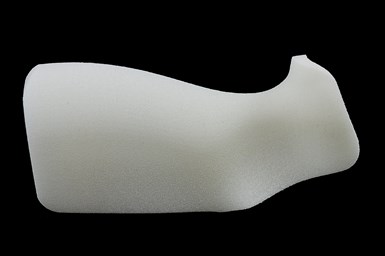Materialise, EOS Qualify to Supply Airbus 3D Printed Parts
The qualification is valid across Airbus and marks a milestone for the wider adoption of polymer 3D printing in aerospace.

The newly qualified EOS PA 2241 FR material is a flame-retardant Polyamide12-based material which is used for processing in laser sintering systems.
Materialise has been qualified by Airbus to manufacture flight-ready parts using laser sintering technology. The material used in the process is a flame-retardant polyamide (PA 2241 FR) produced by EOS.
With this development, Materialise and EOS become the first suppliers to be qualified by Airbus to produce laser sintered parts under the Airbus Process Specification AIPS 03-07-022. Materialise now offers two 3D printing technologies approved by Airbus for flight-ready parts.
The qualification is valid across Airbus and marks a milestone for the wider adoption of polymer 3D printing in aerospace, the company says. The material offers Airbus and its suppliers a cost-effective complement to the initially validated 3D printing material Ultem 9085, also used at Materialise. By bringing laser sintering onboard, Airbus broadens its usage of 3D printing with the world’s second most commonly used 3D printing technology.
In addition to the material PA 2241 FR, qualification also encompasses the respective processes for 3D printing the material on EOS systems. In particular, Materialise will leverage EOS systems including the EOS P 770 to manufacture PA 2241 FR parts for Airbus.
The newly qualified EOS PA 2241 FR material is a flame-retardant Polyamide12-based material which is used for processing in laser sintering systems. Due to its high refresh rate, the material enables cost-effective production while meeting the strict quality standards required of flight-ready parts, the company says. Typical aerospace applications include aircraft interior parts such as air ducts and brackets. The material is suitable for parts which must fulfill fire, smoke and toxicity requirements without use of a primer and top coating.
Materialise currently prints around 100 different part numbers for the Airbus A350, totaling an estimated 26,000 parts per year across the A350 ecosystem. Additionally, the company is also set to supply parts for other Airbus aircraft platforms, including the A320, A330 and A340. For this, EOS industrial 3D printing technology also plays a key role.
Related Content
-
3D Printed Lattices Replace Foam for Customized Helmet Padding: The Cool Parts Show #62
“Digital materials” resulting from engineered flexible polymer structures made through additive manufacturing are tunable to the application and can be tailored to the head of the wearer.
-
Concept Sneaker Boasts One-Piece 3D Printed TPU Construction
The Reebok x Botter Concept Sneaker Engineered by HP premiered at Paris Fashion Week, hinting at manufacturing possibilities for the future of footwear.
-
What Does Additive Manufacturing Readiness Look Like?
The promise of distributed manufacturing is alluring, but to get there AM first needs to master scale production. GKN Additive’s Michigan facility illustrates what the journey might look like.













